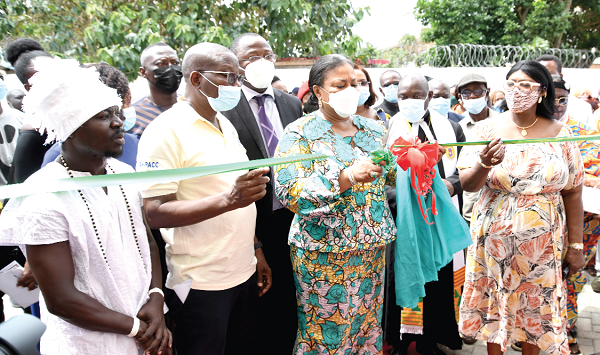
First Lady inaugurates hostel for childhood cancer patients
The First Lady, Mrs Akufo-Addo, has inaugurated a 54-bed hostel facility at the Korle-Bu Teaching Hospital to house children undergoing treatment for cancer and their parents.
The project was executed by the Rebecca Foundation, in collaboration with the Ghana Parents’ Association for Childhood Cancers (GHAPACC).
Inaugurated in Accra last Wednesday, the facility has been described as the first of its kind in the country and the biggest in Africa.
Mrs Akufo-Addo said she initiated the project because one major challenge faced by children with cancers accessing care at the hospital and their parents was accommodation for the duration of the treatment, especially those from afar.
She said that resulted in low turnouts for childhood cancer treatment at the two treatment centres in the country, one in Accra and the other in Kumasi.
Mrs Akufo-Addo said having identified the problem, she made a promise on February 15, 2017 at the sod-cutting ceremony for the project, where she was the special guest of honour, to build the hostel facility.
The facility, she added, would relieve the stress of having to travel several hours repeatedly for treatment, along with its associated costs and risks for children and their families.
![]()
Front view of the hostel facility.
Taboo
The First Lady mentioned that the denial, agony, desperation and the financial burden associated with childhood cancer, made it almost a taboo subject.
However, she said, it was necessary that the darkness surrounding cancer be dispelled by everyone playing their part.
“We must speak about hope. Because, really, when diagnosed early, treatment initiated on time and comprehensively; recovery is pretty high for childhood cancer,” she said.
A Deputy Minister of Health, Ms Tina Gifty Naa Ayeley Mensah, expressed gratitude to the First Lady and her foundation for the facility.
“I wish to urge the hospital authorities to institute plans, preventive and management schedule for this beautiful edifice that has been constructed and donated to the hospital for use by children undergoing cancer treatment and their parents,” she said.
The chairman of the event, Dr David Nkansa-Dwamena, said cancer treatments had greatly improved causing more people to survive the condition and assured stakeholders that the facility would be maintained very well.
GHAPACC
The president of the GHPACC, Dr Felix Kwame Aveh, expressed profound gratitude to the First Lady and her foundation for the hostel facility.
The facility, he said, was well-furnished with everything necessary to ensure that children undergoing treatment were comfortable.
He explained that the formation of GHAPACC was necessitated by the realisation that 75 per cent of childhood cancers were curable.
The association, he said, was made up of parents of children diagnosed with cancer and childhood cancer survivors, explaining that the association provided avenues for parents and families to interact, share experiences and advocate improved care for children with cancer and other life-threatening blood disorders.
Dr Aveh added that over 80 per cent of childhood cancers treated at the Korle-Bu Teaching Hospital were referred cases from the other regions, half of which abandoned the treatment after few visits to the hospital.
“Members of GHAPACC investigated and found out that affected families did not abandon treatment because they had lost hope and given up, but rather due to accessibility challenges,” he said.
Mr Aveh appealed to the National Health Insurance Authority (NHIA) to amend the policy of the National Health Insurance Scheme (NHIS) to include childhood cancers treatment.
That, he said, would alleviate the financial burden placed on parents and guardians taking care of children undergoing treatment for cancer and increase their chances of survival.
